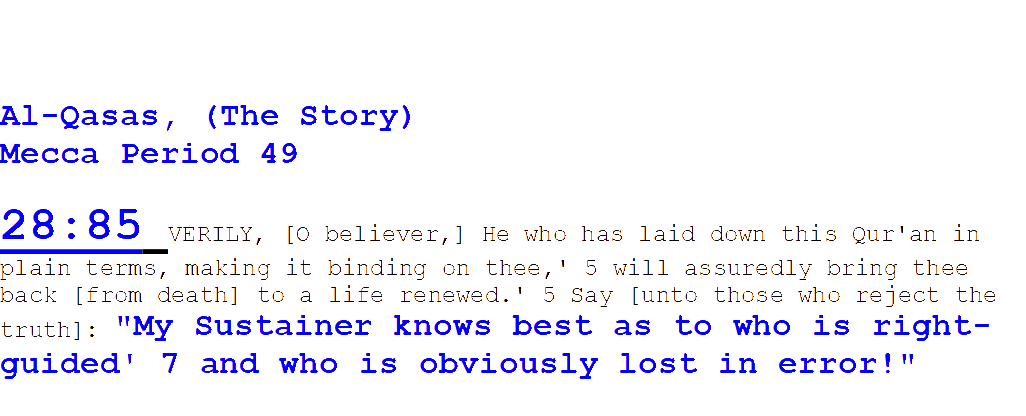Non-Judgmental
Sura-26 [Al Shu'ara'mecca 47]
The Quranic Text & Ali’s version:
إِنْ حِسَابُهُمْ إِلَّا عَلَى رَبِّي...
26:113. "Their account is only with my Lord,
if ye could (but) understand.
وَمَا
أَنَا بِطَارِدِ
الْمُؤْمِنِينَ
﴿١١٤﴾
![]()
26:114. "I am not one to drive away those who believe.
C3190. Cf. 11:29.
All people who have faith have the right to come and listen to Allah's Word and receive Allah's Mercy, whether they are publicans and sinners, "Harijans" and low-caste men, men of "superior" or "inferior" races. The Prophet of Allah welcomes them all, as His Message has to shine before the whole world. (R).
Asad’s Version:
THE PEOPLE of Noah [too] gave the lie to [one of God's] message-bearers (26:106) when their brother Noah said unto them: "Will you not be conscious of God? (26: 107) Behold, I am
an apostle [sent by Him] to you, [and therefore] worthy of your trust:
(26:108) be, then, conscious of God, and pay heed unto me!
26:109 "And no reward whatever do I ask of you for it: my reward rests with none but the Sustainer of all the worlds.
(26: 110) Hence, remain conscious of God, and pay heed unto me! "
(26: 110) They answered: "Shall we place our faith in thee, even though [only] the most abject [of people] follow thee?" 4 ' (26:112) Said he: "And what knowledge could I have as to what they were doing [before they came to me]?
(26:113) Their reckoning rests with none but my Sustainer: if you could but understand [this]! 50 (26:114) Hence, I shall not drive away [any of those [who profess to be] believers;
(26: 1 15) I am nothing but a plain warner."
26:116 Said they: "Indeed, if thou desist not, O Noah, thou wilt surely be stoned to death!" 51 (26: 1 17) [Whereupon] he prayed: "O my Sustainer! Behold, my people have given me the lie:
(26:118) hence, lay Thou wide open the truth between me and them, 52 and save me and those of the believers who are with me ! "
[[Asad’s note - 50
This is obviously a retort to the unbelievers' suggestion (elliptically implied here) that those "abject" followers of Noah had declared their faith in him, not out of conviction, but only in order to gain some material advantages.
Noah's answer embodies a cardinal principle of Qur'anic ethics and, hence, of Islamic Law: No human being has the right to sit in judgment on another person's faith or hidden motives; whereas God knows what is in the hearts of men, society may judge only by external evidence (az-zahir), which comprises a person's words as well as deeds. Thus, if anyone says, "I am a believer", and does not act or speak in a manner contradicting his professed faith, the community must consider him a believer. ]]
